The inability of both the Indian central and West Bengal state governments to resolve the ongoing doctors’ strikes has exacerbated the crisis in the healthcare sector, following the brutal rape and murder of a trainee doctor at a state-run hospital in Kolkata. The incident, which took place in early August 2024, has ignited widespread protests and strikes across the country, led by doctors and medical students demanding justice and improved security at healthcare facilities.
The strikes, initially sparked by the horrific crime, have expanded in scope due to perceived governmental inaction and inadequate responses to the medical community’s demands. Despite meetings between medical associations and government officials, including assurances of safety reforms and a promise to investigate the crime thoroughly, the situation has only worsened.
Key demands from the medical community include a comprehensive overhaul of working conditions, which many argue contributed to the vulnerabilities faced by the victim, and the implementation of a central law to protect healthcare workers from violence. The failure to meet these demands has led to a resurgence of protests, with the Federation of Resident Doctors’ Association (FORDA) reversing an earlier decision to call off the strike, citing ongoing violence against doctors and dissatisfaction with the government’s promises.
In West Bengal, the state’s handling of the situation has drawn significant criticism. The Chief Minister’s call for a rapid investigation and the involvement of the Central Bureau of Investigation (CBI) have not been enough to quell the unrest. Moreover, the state’s attempts to manage the fallout from the crime, including accusations of mishandling the investigation and the subsequent vandalism at the hospital, have only intensified the anger within the medical community.
Nationwide, the impact of the strikes has been profound, with medical services severely disrupted. Outpatient departments in many hospitals have shut down, and elective surgeries have been postponed indefinitely. The Indian Medical Association (IMA) and other medical bodies have issued a nationwide call to action, demanding justice for the victim and the immediate implementation of protective measures for medical staff.
The crisis underscores a broader failure to address systemic issues within India’s healthcare infrastructure, where overworked and under-protected doctors face increasing risks. The governments’ inability to negotiate an end to the strikes not only highlights the gravity of the situation but also raises concerns about the long-term implications for healthcare delivery in the country.





